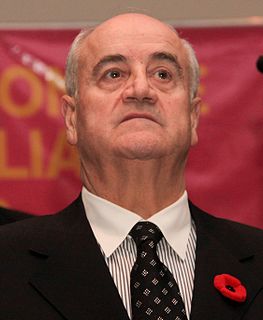A search warrant is a court order that a magistrate or judge issues to authorize law enforcement officers to conduct a search of a person, location, or vehicle for evidence of a crime and to confiscate any evidence they find. In most countries a search warrant cannot be issued in aid of civil process.
Bail is a set of pre-trial restrictions that are imposed on a suspect to ensure that they comply with the judicial process. Bail is the conditional release of a defendant with the promise to appear in court when required.

Julian Fantino, is a Canadian retired police official and former politician. He was the Conservative Party of Canada Member of the Parliament of Canada for the riding of Vaughan following a November 29, 2010 by-election, until his defeat in 2015. On January 4, 2011, Fantino was named Minister of State for Seniors; on May 18, 2011, he became Associate Minister of National Defence; on July 4, 2012, he was named Minister for International Cooperation. Fantino served as the Minister of Veterans Affairs from 2013 until 2015, when he was demoted to his earlier post of Associate Minister of National Defence following sustained criticism of his performance at Veterans Affairs. He was defeated by Liberal candidate Francesco Sorbara in the 2015 election.

The Personal Information Protection and Electronic Documents Act (PIPEDA) is a Canadian law relating to data privacy. It governs how private sector organizations collect, use and disclose personal information in the course of commercial business. In addition, the Act contains various provisions to facilitate the use of electronic documents. PIPEDA became law on 13 April 2000 to promote consumer trust in electronic commerce. The act was also intended to reassure the European Union that the Canadian privacy law was adequate to protect the personal information of European citizens. In accordance with section 29 of PIPEDA, Part I of the Act must be reviewed by Parliament every five years. The first Parliamentary review occurred in 2007.
The Ontario Municipal Board (OMB) was an independent administrative board, operated as an adjudicative tribunal, in the province of Ontario, Canada. It heard applications and appeals on municipal and planning disputes, as well as other matters specified in provincial legislation. The tribunal reported to the Ministry of the Attorney General from 2012 until its shuttering. The Board had been criticized for its broad powers and authority to override the Planning Act decisions of municipal councils.

Elections Ontario is an independent office of the Legislative Assembly of Ontario responsible for the administration of provincial elections and referenda. It is charged with the implementation and enforcement of the Election Act, Election Finances Act, Representation Acts (various), as well as specific portions of the Municipal Elections Act, 1996, Taxpayer Protection Act, 1999, and Fluoridation Act. The agency collects information about political parties, candidates, constituency association, leadership contestants, and third parties involved in Ontario politics. Elections Ontario is led by the Chief Electoral Officer, a non-partisan Officer of the Legislative Assembly chosen by an all-party committee. Greg Essensa, appointed in 2008, is the current Chief Electoral Officer. His predecessor was John Hollins, who held the position from 2001-2008.
The Privacy Act is Canadian federal legislation that came into effect on July 1, 1983. The act sets out rules for how institutions of the federal government must deal with personal information of individuals. Some salient provisions of the legislation are as follows:
Privacy law refers to the laws that deal with the regulating, storing, and using of personally identifiable information of individuals, which can be collected by governments, public or private organizations, or other individuals.

The Federal Circuit Court of Australia, formerly known as the Federal Magistrates Court of Australia, is an Australian court with jurisdiction over matters broadly relating to family law and child support, administrative law, admiralty law, bankruptcy, copyright, human rights, industrial law, migration, privacy and trade practices.

The Information and Privacy Commissioner of Ontario was established as an officer of the Legislature by Ontario's Freedom of Information and Protection of Privacy Act, which came into effect on January 1, 1988. The current commissioner is Brian Beamish.

The Guelph Police Service (GPS) is the police force for the city of Guelph, Ontario. The GPS was formed in 1827 with the founding of the city, and has grown to an authorized strength of 197 sworn officers, a civilian staff of 84 and serves a population of around 120,000. The chief of police is Jeff DeRuyter and the departmental headquarters are located at 15 Wyndham Street South. The force is governed by the Police Services Act of Ontario, under which a five-member civilian "police services board" is responsible for the Guelph police.

The intellectual property rights on photographs are protected in different jurisdictions by the laws governing copyright and moral rights. In some cases photography may be restricted by civil or criminal law. Publishing certain photographs can be restricted by privacy or other laws. Photography can be generally restricted in the interests of public morality and the protection of children.
Gary McHale is a Canadian political activist, who is noted for his involvement in the Grand River land dispute and his role in the founding of the advocacy group, Canadian Advocates for Charter Equality, or CANACE.
Canadian privacy law is derived from the common law, statutes of the Parliament of Canada and the various provincial legislatures, and the Canadian Charter of Rights and Freedoms. Perhaps ironically, Canada's legal conceptualization of privacy, along with most modern legal Western conceptions of privacy, can be traced back to Warren and Brandeis’s “The Right to Privacy” published in the Harvard Law Review in 1890, Holvast states “Almost all authors on privacy start the discussion with the famous article The Right to Privacy of Samuel Warren and Louis Brandeis”.
A Doe subpoena is a subpoena that seeks the identity of an unknown defendant to a lawsuit. Most jurisdictions permit a plaintiff who does not yet know a defendant's identity to file suit against John Doe and then use the tools of the discovery process to seek the defendant's true name. A Doe subpoena is often served on an online service provider or ISP for the purpose of identifying the author of an anonymous post.
Bail in Canada refers to the release of a person charged with a criminal offence prior to being tried in court or sentenced. The Canadian Charter of Rights and Freedoms guarantees the right not to be denied reasonable bail without just cause. That right is implemented by the Criminal Code, which provides several ways for a person to be released prior to a court appearance. A person may be released by a peace officer or by the courts. A release by the courts is officially known as a judicial interim release. There are also a number of ways to compel a person's appearance in court without the need for an arrest and release.
Privacy in Australian law is not an absolute right and there is no clearly recognised tort of invasion of privacy or similar remedy available to people who feel their right to privacy has been violated. Privacy is, however, affected and protected in limited ways by the Australian common law and a range of Commonwealth, state and territorial laws, and administrative arrangements.
The Office of the New Zealand Privacy Commissioner was established to administer the Privacy Act 1993. The Privacy Commissioner is entrusted to protect personal information of New Zealanders in accordance with the Privacy Act.








